The Road to Financial Freedom: Mastering Affiliate Marketing
“If you don't find a way to make money while you sleep, you will work until you die.”
― Warren Buffett.
Wouldn’t it be nice if you could make money when not actively working? When your bank account gets credited while you’re on vacation or taking a nap?
If Pat Flynn’s story inspires you to build something of your own that helps you earn over millions of dollars in revenue, affiliate marketing may be what you’re looking for!
It can be one of the smartest choices to generate passive income and build a solid revenue stream using your online presence and reputation.
It’s true that you need to put time and effort into building a steady business model and create content at a serious scale, during its initial days.
But once that’s done, you can leverage it for earning affiliate commissions for several months and years to come. And gain financial freedom!
This article is aimed at helping beginners start a profitable affiliate marketing business, but seasoned marketers will also be benefited from reading it.
What is Affiliate Marketing and How Does it Work?
Affiliate marketing is the process of promoting a product or service by sharing it on a blog, social media, podcast, or email. The affiliate earns a commission when someone completes a desired action, such as a purchase or download through the affiliate link.
The affiliate links contain special tracking codes, oftentimes it’s the affiliate's ID or username, and are used for tracking traffic from the affiliate's site to the merchant's site. Clicking on each affiliate link creates a cookie on the visitor's browser, allowing the merchant to track all clicks and purchases that originated from that link. The affiliate gets a commission when a buyer completes a transaction within the cookie period.
Perhaps you’ve already seen popular blogs or YouTube videos served with a disclaimer, such as:
“This blog is reader supported…”
“We may earn affiliate commissions…” — These are examples of affiliate marketing in action.
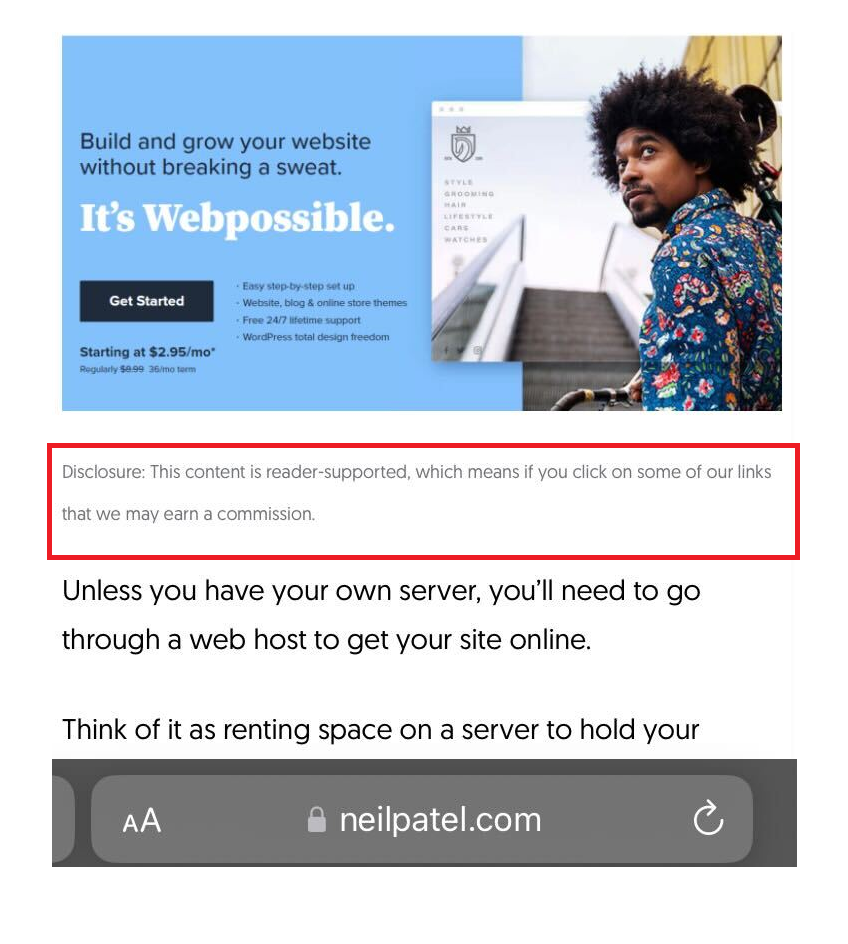
How to Become an Affiliate Marketer
The process is simple.
Find products people are interested in learning about or buying, attract them through blogs, social media posts, or other methods, and direct them to where they can make a purchase.
But there are a few things you need to keep in mind to avoid mistakes and increase your earning potential. We’ve covered it in a step-by-step walkthrough for your better understanding.
1. Find a Niche to Monetize
The first step to begin your affiliate marketing journey is to find a niche.
When deciding on your niche, think about what you're passionate about and whether or not that passion will translate into profit.
Key points to consider:
- Usually, we have a lot of expertise on a topic we love, which makes it much easier to produce original content.
- If the topic is broad, you’d be able to write several articles and social media posts covering different angles and build authority for that niche.
- Try to choose a niche that has high demand but low to moderate competition.
- To go ahead with a competitive or saturated niche, you need a solid plan and creative ways to attract your audience.
- Remember to check the average income for your category so you can estimate the earning potential.
Ideas to help you find trending and profitable niches:
- People have different hobbies and interests, and each one can be turned into a thriving affiliate business. For example - travel, casino, betting, photography, sports.
- If you like finance and money topics, crypto, trading, investing, card management, personal finance, and mortgage are good choices.
- Health and lifestyle categories have some of the most searched topics, such as diet, fitness, weight loss, yoga, and aromatherapy.
- For marketing and technology, you can choose from an array of topics, including web hosting, web development, gaming, productivity, VPN, email marketing, and social media. All of them are oversaturated but have high demand.
- Home improvement niches include interior and exterior decoration, home security, gardening, repair, plumbing, DIY, heating and cooling.
- Fashion and beauty affiliate topics can include cosmetics, apparel, accessories, personal care.
2. Research Affiliate Programs
Here are a few questions you should ask yourself when you're researching affiliate programs:
- Do you meet the eligibility criteria?
- Are you interested in the products or services the program promotes?
- What is the commission structure?
- What is the minimum payout?
- What is the cookie period?
- What kind of support does the program offer?
- What are the terms and conditions?
As you seek answers to these qualifying questions, you can narrow down your options and find an affiliate program that's right for you.
Most businesses have separate affiliate marketing programs and you can easily find them online. Go to their website, check all the details, complete the steps as asked, submit the application/proposal, and wait to hear from them, or get started instantly if they allow it.
Alternatively, you can join affiliate marketplace and networks to find relevant programs in one place and save time.
A few affiliate marketing networks and programs you can consider are:
- Hashtag Expert: Our team at Hashtag Expert has curated a list of reputable, reliable, and profitable affiliate programs to help our users make money. As an app user, you can enjoy this feature at no additional cost and browse through the list of leading brands across various industries. Keep an eye out for notifications so that you know when it’s available for you.
- Amazon Associates Program: Amazon Associates is an affiliate marketing program that allows content creators, bloggers, and publishers to create content and promote products using affiliate links and monetize traffic.
- Rakuten Advertising: As one of the leading global affiliate marketing networks, Rakuten Advertising opens ways for content creators to find brands they can partner with and earn money.
- ClickBank: ClickBank is an affiliate marketplace that helps affiliate members find products to promote. Their payout is attractive, and affiliates can earn up to $150 per sale.
- Etsy's Affiliates Program: Like most businesses, Etsy also offers an affiliate program and currently pays a 5% standard commission. You must fulfill specific rules and requirements to join the program and receive payment.
Make sure you're signing up to promote products that you believe in and will be relevant to your audience.
Promoting Affiliate Links
Successful affiliate marketers know how to promote their links. They know how to create effective content, how to drive traffic to their content, and how to convert visitors into customers.
Now there are multiple ways to distribute affiliate links, such as through social media posts, podcasts, blogs and websites, and email.
Let’s take a look at some of these with the type of content you can produce.
Promoting Affiliate Products on Social Media
To make the best use of social media for affiliate marketing, you need to build an engaged community of followers and earn their trust.
You can share affiliate links and promote products directly through individual posts. Or, create a customized landing page using links in bio tools like LinkTree and share it on your profile.
Another way is to join platform-specific affiliate programs such as on Instagram and TikTok.
As you might be aware, Instagram closed its native affiliate program on August 31 2022 leaving only choice for creators - partnering with brands independently.
Creators can use a variety of tools and methods to promote afiliate products:
- Link in bio tools are a great way to drive traffic to a landing page, where you can showcase multiple products and pages. To get started, create a dedicated URL and add it to your Instagram profile. When sharing posts or reels, ask your followers check your "link in bio." Now when someone clicks on the link, they will be taken to your landing page where they can view all of the affiliate product links that you have shared publicly.
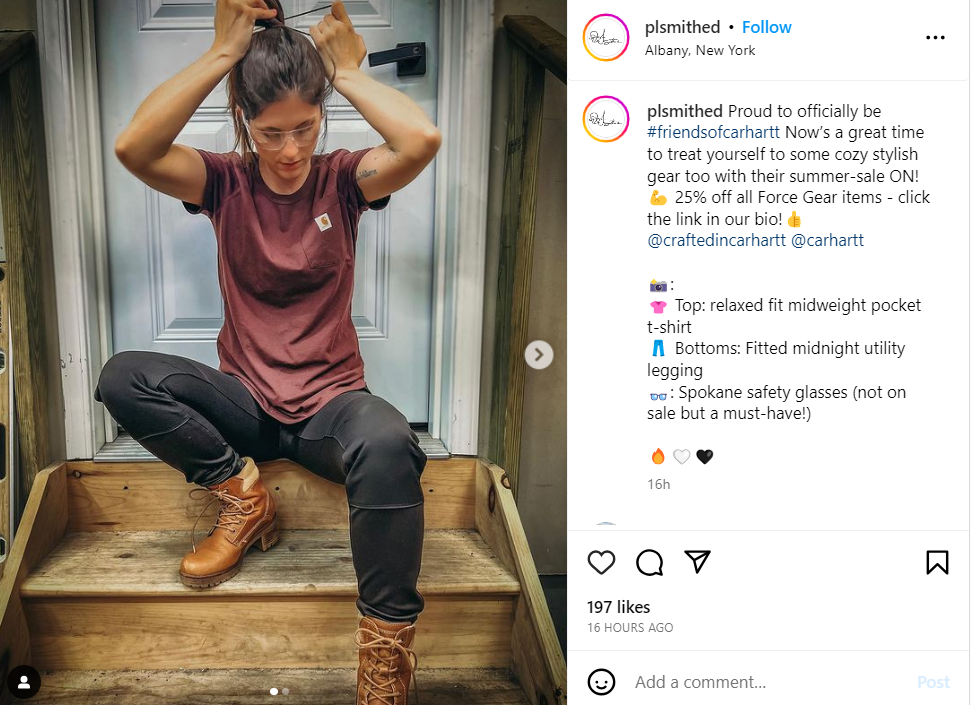
- Affiliate marketers on Instagram can also promote links by creating photos and videos that showcase the products and include affiliate codes in the caption.

We've written a blog about how to monetize your Instagram and discussed how to promote affiliate links on Instagram.
TikTok
Creators and influencers on TikTok can participate in the affiliate program, find and collaborate with brands on the same platform, promote relevant products to their audience, and earn commissions.
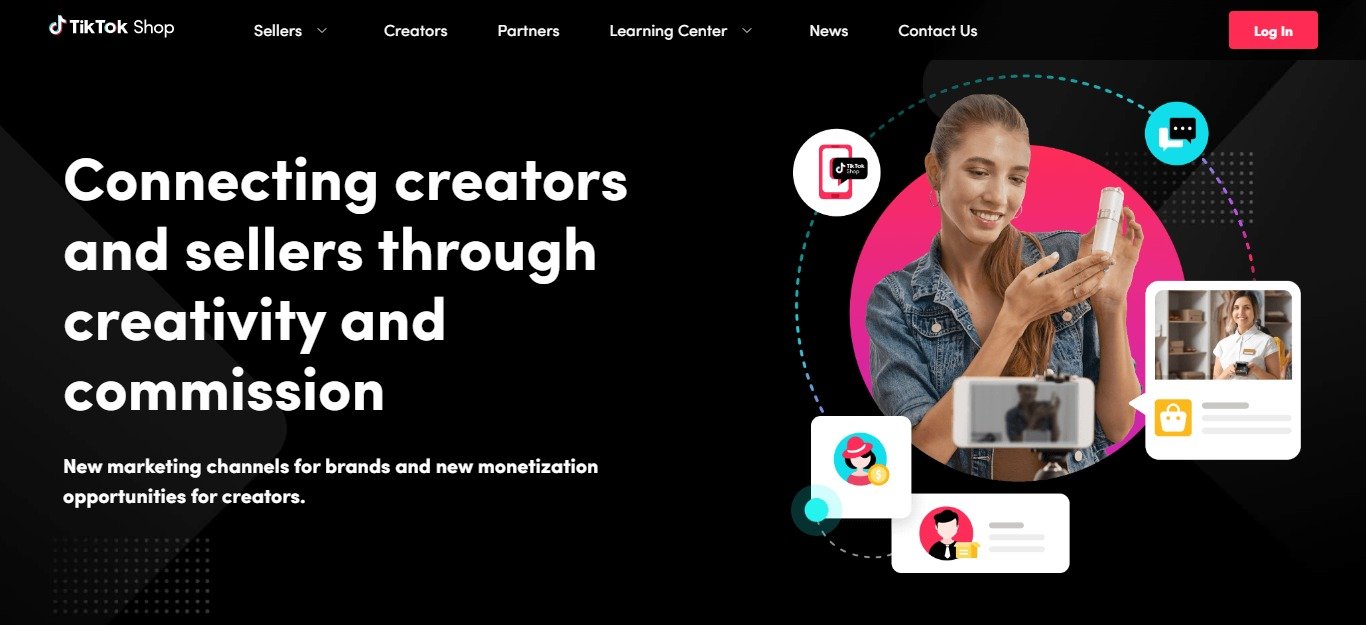
To sell affiliate products on Tiktok, you would typically need to set up a Shop. However, this program is only available in certain locations and has only recently become available in the US. That's why collaborating with brands independently and promoting them on your own can a great idea!
Read our dedicated guide to learn how TikTok affiliate marketing works, and how to promote partner links on the platforms and make money.
YouTube doesn’t have a native program but allows affiliate link sharing and product promotions on its platform. As a good practice, affiliates need to disclose it in the description.
If you enjoy creating how-to videos, recipes, or product reviews, YouTube might be a place to promote and share affiliate links.
Note: Don’t confuse this with the YouTube Partner Program which is different from what we’re.
Here’s an example of an affiliate marketing video on YouTube.
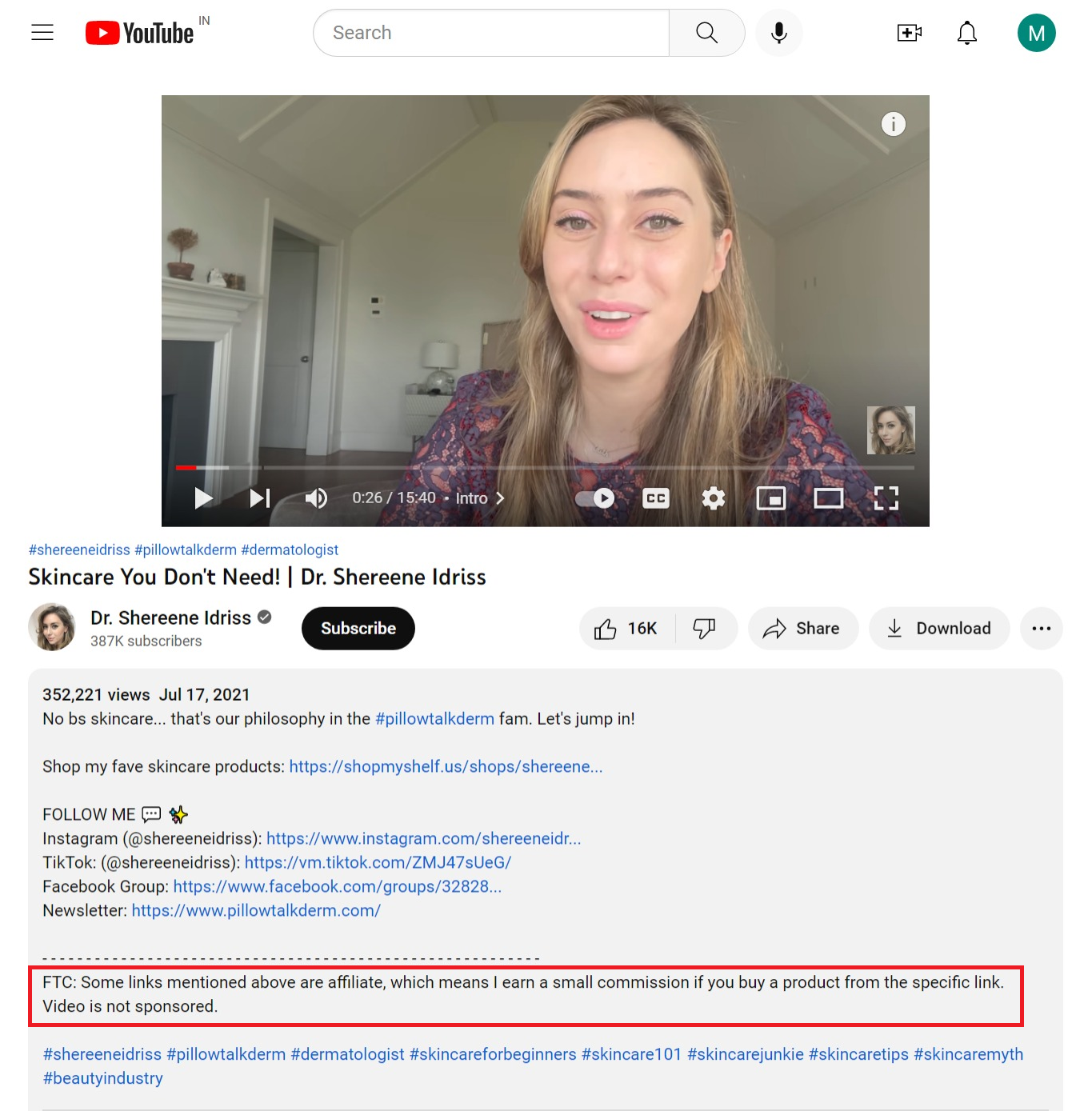
Pro Tip: Always use relevant hashtags when you’re sharing content on social media including on YouTube (as you see in the image above).
They’re helpful in getting your posts more impressions, engagement, and followers. Hashtag Expert helps you find millions of hashtags that are a good match for your account, which you copy and paste onto Instagram or TikTok.
Promoting Affiliate Products Through Email Marketing
Email marketing is a great way to send affiliate links to email subscribers and earn commissions when they make a purchase.
The best part about email marketing is you can send personalized content and links to a particular set of audience so that they receive relevant and authentic content, and you have a higher chance of converting them.
Promoting Affiliate Products on Blogs and Websites
There are hundreds of ways to promote affiliate links on your blogs and websites. Depending on the type of product/service you’re promoting, you can create tutorials, recipes, comparison-style blogs, listicles, product reviews, and much more. Apply the best SEO practices to increase organic visibility for your blogs.
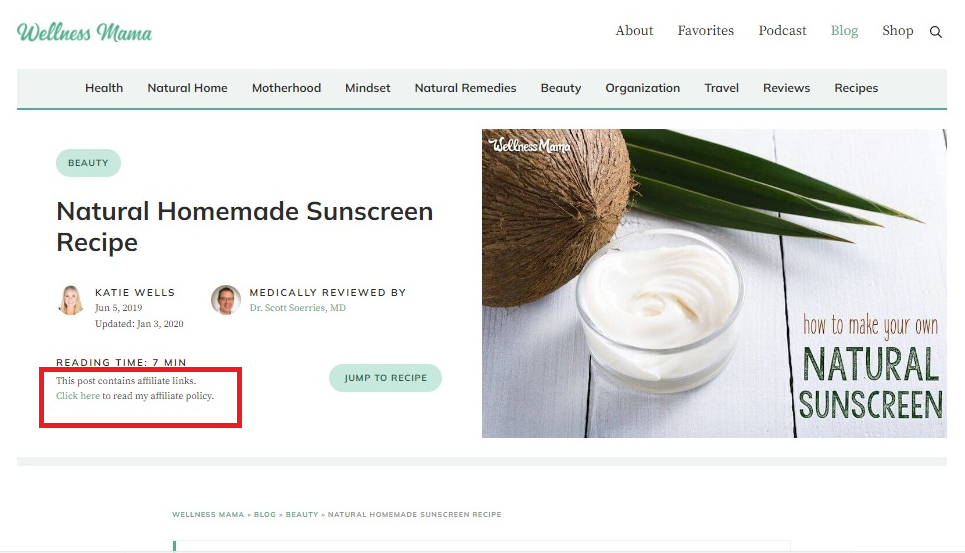
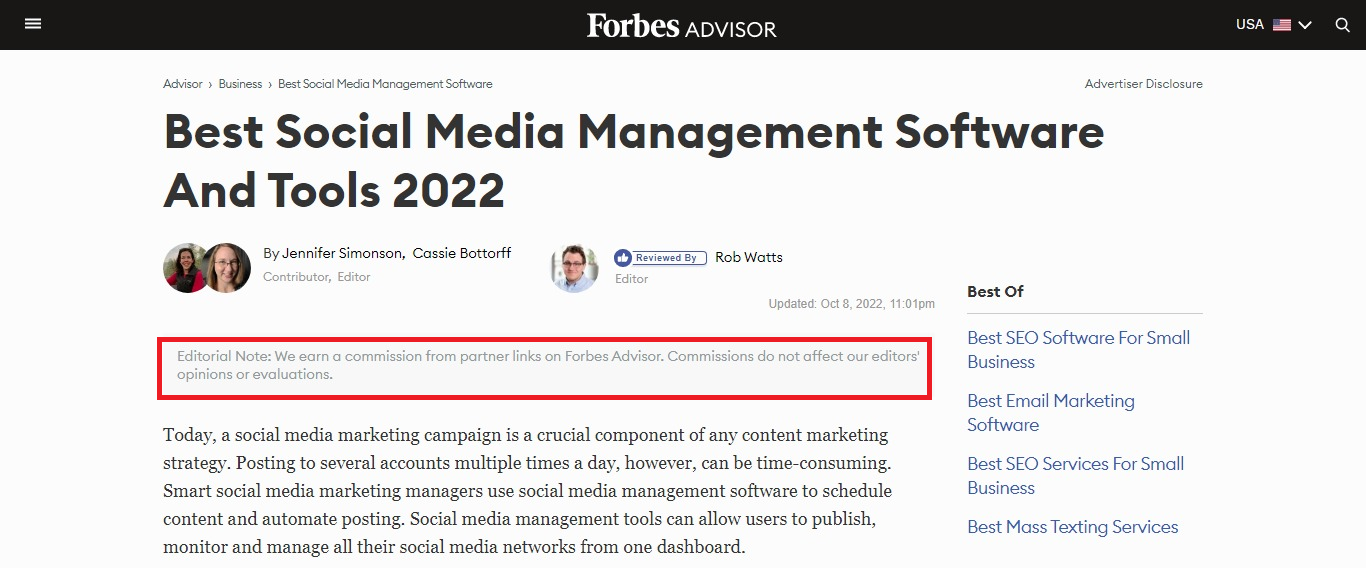
How Do Affiliate Marketers Get Paid
A sale is the most common type of closure that qualifies for affiliate earning. But depending on your program, you can earn per click, download, or lead.
The process is simple:
- You display content or an ad with a link to the store.
- Buyer clicks your affiliate link and lands on the store webpage.
- Buyer makes a purchase.
- Your affiliate network records the sale.
- You get your commission.
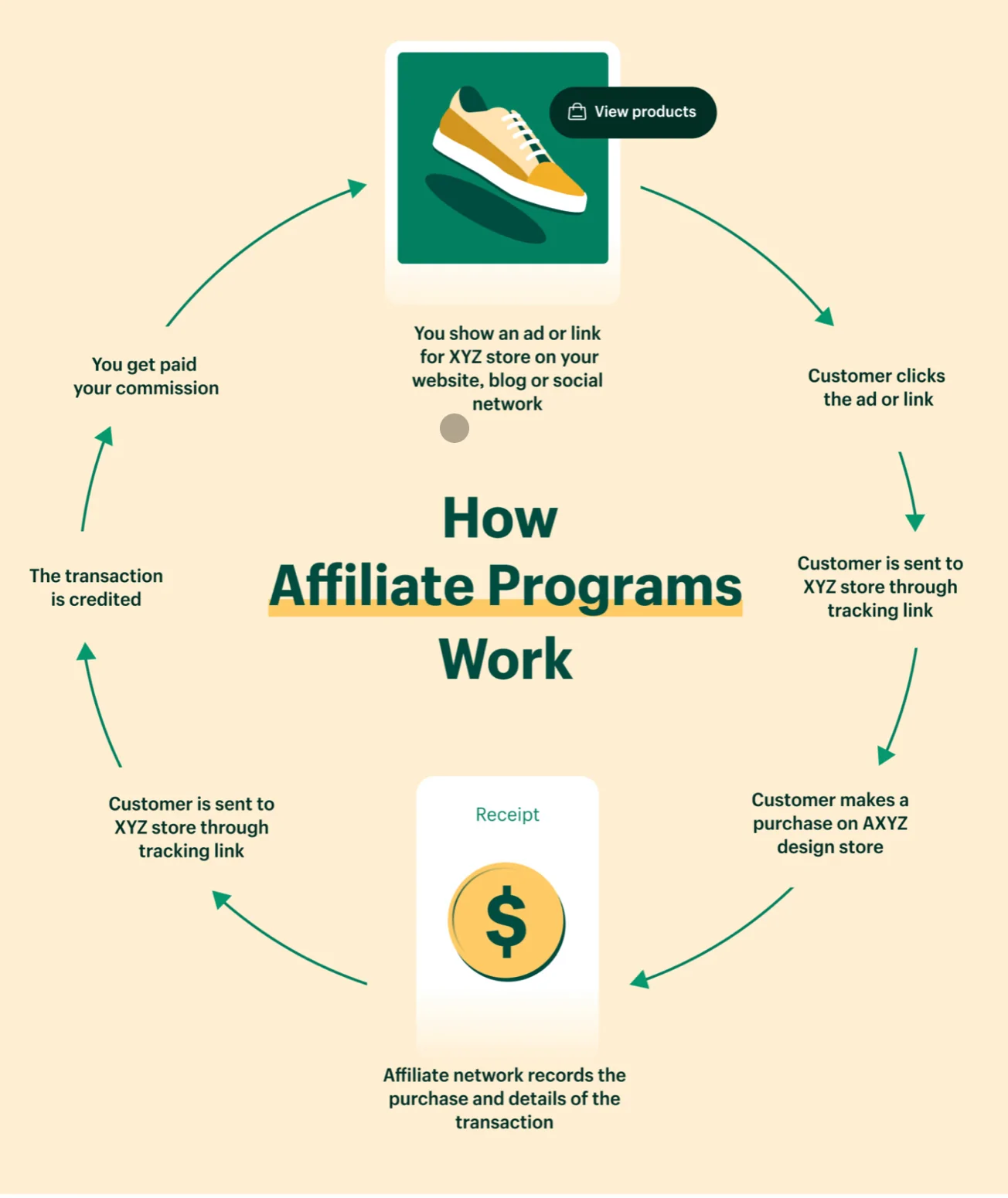
Best Practices for Affiliate Marketing to Help You Earn More Money
Here are seven tips to help you master affiliate marketing and earn more.
1. Don’t sell. Educate
Your content shouldn’t sound like you’re being pushy because that’s not going to help. You want to entertain your audience, educate them, share your unique perspective, and empower them.
2. Create quality content
High quality helps build trust and establish you as an authority in your niche. When creating videos, blogs, or social media posts, always be authentic, accurate, and honest. Use your content to help your audience decide what’s best for them, and they’ll love it.
3. Select reliable brands with products you see yourself promoting
Try to choose products you’ve already used or those you’re interested in exploring because you’ll have a lot to discuss. It’s easy to create content and share an opinion for products/niches you’re familiar with. Avoid brands that don't suit your marketing style or niche.
4. Build an engaged social media community
You can use social media to develop your brand and promote affiliate products, drive your audience to your website, and to even build an email list. But for that, you need to surround yourself with an engaged community that trusts you. Therefore, invest in building your personal brand on social media so you can reap the benefits.
5. Use hashtags
If you want more people to see your content, use hashtags!
Hashtags are used to highlight keywords and topics on Instagram, TikTok, YouTube, and other social media platforms. They can help you reach a wider audience, connect with like-minded people, and find new followers organically.
6. Make affiliate disclosures
You must disclose your affiliation with brands you’ve agreed to promote on your site. It’s a requirement for most brands that allow affiliate signups and also by the US Federal Trade Commission (FTC).
7. Be patient and consistent
It's important to be patient and consistent when it comes to affiliate marketing. Keep going even if you don't see immediate results because it takes time to build authority and an audience.
You need to understand that to earn money while you sleep, you need to put in the effort to make it work. Things may seem hectic in the beginning, but totally worth it. So keep working towards your goals.
Remember that your success in affiliate marketing depends on how much your audience trusts you. Invest in great content, spend time building trust and loyalty, and monitor the results, so you know what resonates with your audience.
We’re rooting for you!
“If you don't find a way to make money while you sleep, you will work until you die.”
Try Hashtag Expert for Free!
Get tips and tricks for growing your social media and leveraging the power of hashtags straight to your inbox. Zero spam. We promise.


